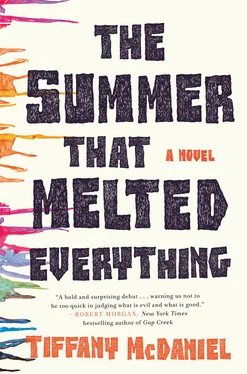The boy’s eyes fell from the clock to the tree in front and its smooth bark and pointed leaves lining the length of the pale gray branches.
“They call it the Tree of Heaven,” I told him. “It’s some sort of ail … ailanthus, Dad calls it. He says they should never have planted it here.”
“Such a name as heaven, you think everyone would plant one in their living rooms.”
“You could plant it in your livin’ room. It’d sure grow outta carpet. Them things grow anywhere. And they just keep growin’. It’s a pest.”
“Peculiar that a tree named after paradise is a pest.”
He spoke all his words in the burdened and slow pace of a pallbearer in wartime.
“Where your folks at? C’mon, I know you’re not the devil.”
From the pocket, he pulled out the bulge, which was a gray pottery bowl with five dark lines of blue circling it. It was followed by a spoon inscribed with LUKE 10:18: I SAW SATAN FALL LIKE LIGHTNING FROM HEAVEN.
“It’s a real shame you don’t have any ice cream. I have everything for it.” He held the items close to his chest.
“We might have some at the house. Ain’t no point in you standin’ here. Don’tcha know the courthouse is shut on Sundays?”
“Is it Sunday?” He held a tightness in his dark brows that stretched to his elbows.
“Yep.”
For what felt like a very long time, he made a quiet study of me. I picked up the bag of groceries and held it like a shield to my chest. Finally he asked, if it was indeed Sunday, why I wasn’t in church.
“Never am.” I shrugged. “Dad will go. He don’t make a regular thing out of it, though. He says the courtroom is his church.” I leaned in as if whispering were the only way to say, “My dad is Autopsy Bliss.”
He too whispered, reciting the last bit of the invitation: “With great faith, Autopsy Bliss.”
I made room for a man and his limping dog. Once they passed, I stepped closer to the boy. “You’re really Satan?”
“Yes.”
“The big man Lucifer?”
He nodded his head.
“The villain of the story?”
“I didn’t say that.”
“If you’re the devil, then you’re the bad one. That’s just the way it is. Well, come on then.”
“Where to?”
“To meet the man who invited you.”
… wakes the bitter memory
Of what he was, what is, and what must be
Worse
— MILTON, PARADISE LOST 4:24–26
FROM THE LOOKS of it, his overalls were his only wearing. Was that a year’s worth of dirt on the strap? The cuffs of the pants? How long did it take to fray the denim like that? To lose the button? To rip that hole by the knee, the biggest of them all?
The only spot not worn was the seat. Did he never sit down? Too busy getting that dirt caked into the thread. That dust settled into the pockets. In some areas, the denim was so thin, you could see his skin lifting like shadow through the thread-baring weave.
He didn’t walk like other boys. There was no bounce, no thrill of movement. I could see him low and deep, peacefully wise below the grass line of the cemetery.
His skin reminded me of when I had been woken by high-pitched screeches outside my window. I rolled out of bed, pressing my face into the screen. It was too dark to see anything, but I knew the birds were close from their battle sounds and the whooshing thud of their wings.
The next morning, a feather lay on the ground beneath my window. It was black on the tip, but the closer it got to the quill, the black began to gray into an almost hurting brown. I thought it a sore color for a feather to have. When I saw the boy, I thought it made for even sorer skin with its reddened tinge.
Once we came to the residential lanes, I watched him as he carefully studied everything from flies on roadkill to a tangle of barbed wire rusting in a field. They were poems handwritten by nature to him, and he was as fascinated with them as I would’ve been about a ticket to the World Series.
“How do you say this place?” he asked.
“Whatcha mean?”
“I mean, the name of the town. How do you say it?”
“Oh, well, most folks think it’s pronounced like the past tense of breathin’. You know, like you just breathed somethin’ in. But it’s not like that at all. Say breath. And then ed. Breath-ed. Say it so the tongue don’t recognize such a large break between Breath and ed. Breathed.”
He repeated after me.
“Yeah, just like that.”
I knew by looking at him, he was the type of boy who got up with the sunrise, already tired, and worked until the sunset, shrunk to the bone. He knew the resilience of a seed, and the vulnerabilities of it also. The blessing of a full field and the destroyed hope of a barren one.
I wondered how many times those dirt-crusted fingernails had tried to pry growth from a drought. How many times those small hands had thrown buckets of water from flooded plains. He knew how to jar and can vegetables the way I knew how to play Mario Bros. We were in the same world, yet to me he smelled of rocket fuel.
“Your eyes…” I stared at his irises, never having seen such a dark yet sparkling shade. They were like July foliage in the sun. “They’re so green.”
“They’re leaves I took as souvenirs from the Garden of Eden.” He said it so certain, I couldn’t doubt its truth.
A truck backfired. Or maybe that was just what that group of kids sounded like as they came bursting from around the corner, nearly knocking the boy over. At first I thought his hands were up in order to catch his balance. Then I realized he was reaching out to the kids. Each sleeve or arm that came close enough he tried to grab hold of but couldn’t. They were passing him by as if he should know better. As if he should know he could never be them. Joyous and free and in pure bliss.
There was someone in the group falling back, calling my name.
It was Flint, always Flint. The boy with Coke-bottle glasses and one eye lazier than the other.
“Hey, Fieldin’.” He ran in place as the others kept forward. “We’re goin’ out to the river for a swim. You comin’? Mason swears he seen an alligator in there.”
“Ain’t nothin’ but a longnose gar.” I shook my head, unimpressed.
“I told ’im.” He wearily shrugged his shoulders while his bare, dirty feet continued to pound the ground as he looked from me to the boy. “Who’s the cricket you got with ya, Fieldin’?”
The boy was looking up, his wide eyes as seemingly edgeless as the sky he tilted to. His mouth slightly opened in dazzled wonder. What drew those wide eyes? That dazzled wonder? Why, nothing more than a hawk. Just something to glance at for most, but to him it was something more. The way he looked at it made it almost holy, a sort of flying cross. The moment spiritual. He could have sat down on a lawn chair and turned it into a pew.
“This is, um, well”—I grabbed the back of my hot neck—“it’s the devil.”
Flint stopped running in place, though his arms took longer to slow down to his sides. “What’s that you say?”
“He’s the devil.”
Flint scratched his temple like his own dad was prone to do in situations of deep figuring. “Let me get this straight, Fieldin.’ You mean to tell me that this here little tick is the devil? The one come to answer your pa’s invitation?”
“That’s right.” I pulled my words close. They seemed less silly like that.
Still his laugh came. Hard and bumpy like the gravelly path that led to his trailer park. He took a step closer to the boy, clicking his tongue the way one would approach a potentially skittish pony. The boy lowered his eyes from the hawk.
Читать дальше












